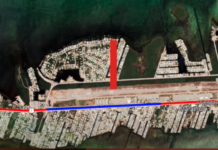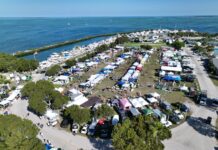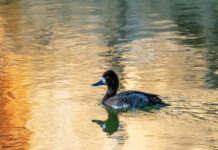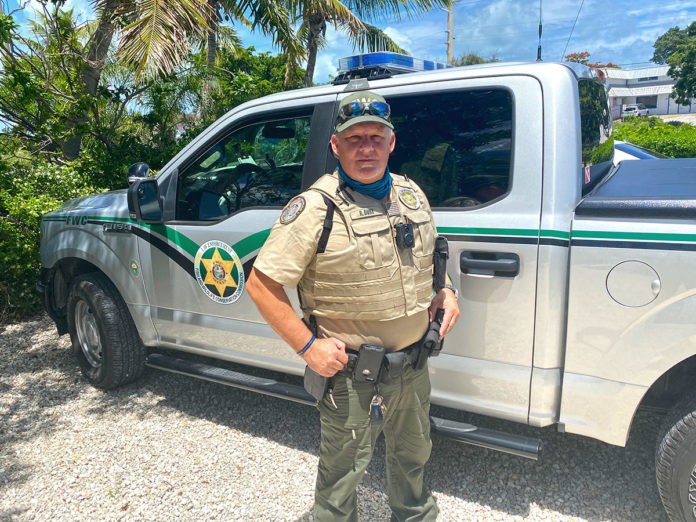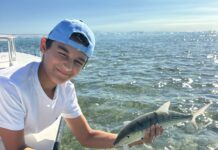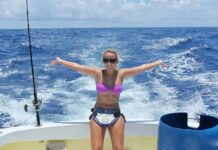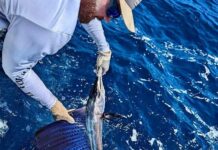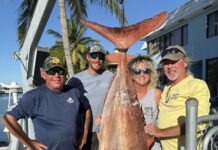Years ago, the state of Florida created a short season giving recreational users the opportunity to catch spiny lobsters before traps were deployed for the commercial season. Commonly referred to as “mini-season,” Florida Fish & Wildlife Conservation Officer Bobby Dube will tell you it’s not the best name for the two-day event.
“Visitors ask, ‘Oh, we can get mini lobsters?’ ‘No,’ I tell them. That’s why I like to call it lobster sport season.”
Dube has experienced the short sports season a time or two. Growing up in Homestead out in the Redlands, he was hired by the former Florida Marine Patrol in 1989. After graduating from the academy, Dube was sent to the Keys in December of that year and has lived in the island chain ever since.
“I love getting out on the water in my personal vessel, going out to the sandbar, going out to lunch with family and watersports with my son and his buddies,” he said. “I enjoy the reefs and everything the Keys has to offer — the gin-clear water. On land, you get to know everybody and everybody knows you. My wife and I really enjoy the community here in the Keys.”
Between the water access and sheer clarity, the Keys remain a top destination for boaters, divers and fishers near and far — not to mention the variety of fish species and lobster, stone crab and everything else in the waters, Dube said.
“You pretty much have your choice of targeting whatever species you want to get that day,” he said.
With water recreation one of the safer activities through the current pandemic, boating, fishing, diving and water sports have increased off the Keys shoreline. That has brought more incidents resulting in injury, and, in two recent cases, fatalities.
Dube usually stations himself outside Divers Direct in Key Largo during the lobster sports season, where he hands out pamphlets and answers questions from visitors coming down to catch lobster. That’s not happening this year, however, due to the pandemic. The Keys Weekly recently sat down with Dube, who is also FWC’s public information officer, to discuss safe recreation with lobster sports season approaching and the summer boating season in full swing.
A lot of people are out on the water these days, especially with the ongoing coronavirus pandemic. What should they keep in mind when hopping into the boat to head out for the day? Whether it’s lobster sports season or just a plain day on the water, safety is the utmost importance for recreating down here, because Monroe County statistically has always led the state in the number of boating accident fatalities, the sheer number of boating accidents and property damage. All the different categories pertaining to boat accidents in Monroe County tend to lead the state. Have safety in mind when you’re going to leave the dock. Don’t drink and boat.
Would you say navigating the Keys water can be tricky if you haven’t been out there a time or two? It can be. It’s a lot easier with electronics. When I started many years ago, we didn’t have a GPS system, so you had to know how to read the water, especially at night. You can get a GPS on your phone, so in that aspect, it’s a little easier. But with the sheer amount of registered boats that come and recreate in the Keys, it increases your percentage of potentially being involved in an accident. We have just under 1 million registered vessels in the state of Florida.
The Keys recently had two boating accidents that led to fatalities. How important is it to check weather and conditions before leaving the dock? In my tenure down here, we’ve had fatalities on bad weather days when nobody should even be out there. Always check the weather before you leave the dock. Even when you are in a boat, afternoon thunderstorms, especially in South Florida, can develop very quickly and sneak up on you. If you’re diving, it might be nice and sunny, but when you come up 30 minutes later there’s been a storm and the boat’s anchor has dragged. It happens. Keep an eye on the weather; it can change.
What are some common violations you see out on the water? Careless operation of a vessel. Not obeying the regulatory markers. No-wake zones at Tavernier and Snake creeks … just not paying attention to those markers or outright ignoring them. A lot of people come down and party, drink and boat and overload boats, and also not having enough life jackets when they’re stopped.
With lobster sport season approaching, what are some things people should remember or do before they head out? Safety, again. Check the weather before you leave the dock. Check to make sure you have all your safety gear in order. There’s a list for that on our website at myfwc.com. Have your fishing license and your crawfish stamp before you leave the dock. Have the current fishing and lobster regulations. You can get that online. If you haven’t scuba dived in a while, take a refresher course beforehand. Check all your dive gear from the regulator to the BCD. Once you’re in the water, well, that’s not the time to be doing that. For safety reasons, I would file a float plan. Just tell someone you’re going out, and if you’re not back by a particular time, alert the authorities.
Any specific items people should bring? Besides the license and lobster stamp, you need a tickle stick and net, the basic tools for harvesting lobster, as well as the lobster measuring gauge. You also need a diver- down flag if you’re going to be snorkeling or scuba diving.
What kind of violations does FWC see most often during the lobster sports season? It would be possession of undersized lobster or lobstering in a closed area. Know the current regulations. Know that you can’t lobster in John Pennekamp State Park, Everglades National Park and down south to Dry Tortugas, and all the SPAs (sanctuary preservation areas).
If people are in need of help out on the water, what should they do? In case of dire emergency, call 911. That goes to MCSO dispatch and they’ll contact us. If it’s a non-emergency, you can always hail FWC or the Coast Guard on channel 16. If you observe a boating safety issue, drunk boaters or resource violation, call the FWC (*FWC or #FWC on a cell phone) or call FWC dispatch at 561-357-4200.





